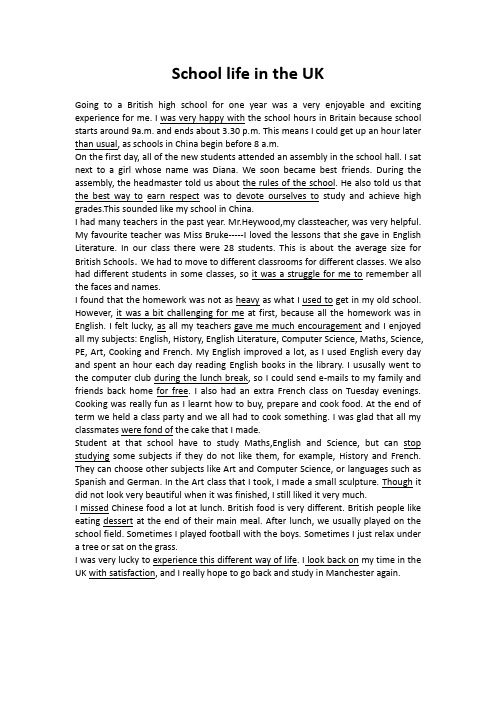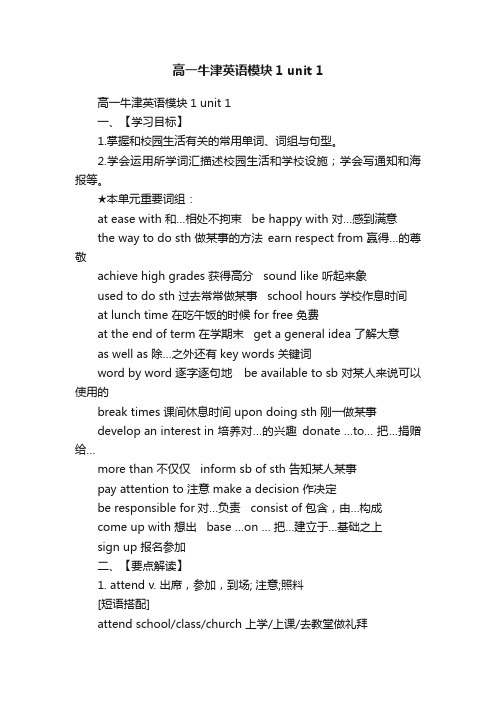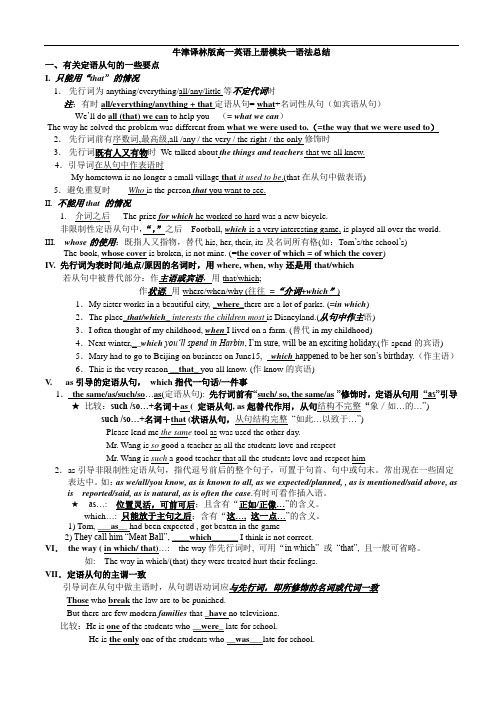高中英语 一模块一单元语法 牛津版必修1
牛津高中英语模块一unit1课文单词及语法

School life in the UKGoing to a British high school for one year was a very enjoyable and exciting experience for me. I was very happy with the school hours in Britain because school starts around 9a.m. and ends about 3.30 p.m. This means I could get up an hour later than usual, as schools in China begin before 8 a.m.On the first day, all of the new students attended an assembly in the school hall. I sat next to a girl whose name was Diana. We soon became best friends. During the assembly, the headmaster told us about the rules of the school. He also told us that the best way to earn respect was to devote ourselves to study and achieve high grades.This sounded like my school in China.I had many teachers in the past year. Mr.Heywood,my classteacher, was very helpful. My favourite teacher was Miss Bruke-----I loved the lessons that she gave in English Literature. In our class there were 28 students. This is about the average size for British Schools.We had to move to different classrooms for different classes. We also had different students in some classes, so it was a struggle for me to remember all the faces and names.I found that the homework was not as heavy as what I used to get in my old school. However, it was a bit challenging for me at first, because all the homework was in English. I felt lucky, as all my teachers gave me much encouragement and I enjoyed all my subjects: English, History, English Literature, Computer Science, Maths, Science, PE, Art, Cooking and French. My English improved a lot, as I used English every day and spent an hour each day reading English books in the library. I ususally went to the computer club during the lunch break, so I could send e-mails to my family and friends back home for free. I also had an extra French class on Tuesday evenings. Cooking was really fun as I learnt how to buy, prepare and cook food. At the end of term we held a class party and we all had to cook something. I was glad that all my classmates were fond of the cake that I made.Student at that school have to study Maths,English and Science, but can stop studying some subjects if they do not like them, for example, History and French. They can choose other subjects like Art and Computer Science, or languages such as Spanish and German. In the Art class that I took, I made a small sculpture. Though it did not look very beautiful when it was finished, I still liked it very much.I missed Chinese food a lot at lunch. British food is very different. British people like eating dessert at the end of their main meal. After lunch, we usually played on the school field. Sometimes I played football with the boys. Sometimes I just relax under a tree or sat on the grass.I was very lucky to experience this different way of life. I look back on my time in the UK with satisfaction, and I really hope to go back and study in Manchester again.单词enjoyable adj. 有乐趣的;令人愉快的experience n./vt. 经历,体验assembly n. 集会,会议headmaster n. 校长earn vt. 获得;赚,挣得respect n./vt. 尊敬,敬重devote vt. 致力于;献身literature n. 文学average adj. 一般的,普通的;平均的struggle n. 难事;斗争;努力vi. 奋斗,努力;挣扎challenging adj. 具有挑战性的encouragement n. 鼓励cooking n. 做饭;烹饪,烹调extra adj. 额外的,外加的fond adj. 喜爱的,喜欢的be fond of 喜爱,喜欢Spanish n./adj. 西班牙语(的);西班牙人(的)sculpture n. 雕像,雕塑dessert n. 甜点look back (on) 回忆,回顾satisfaction n. 满意语法【如何使用正确的引导词】1.找准先行词2.把先行词放入从句中看充当什么成分人主语who/that人宾语who/that/whom人/物定语whose物主语which/that物宾语which/that练习1. The trees are behind the office building have lost their leaves.2. The student we saw just now is the best runner in our school.3. It is no longer the small town it used to be.4. She has a brother name I can’t remember.5. The book I borrowed from the library is very interesting.6.The rest of the time they spend at school is used for independent study.7. I don’t know the name of the teacher I saw in the library yesterday.。
牛津高中英语模块一语法

牛津高中英语模块一语法Module1 Teenage experiencesUnit 1 School lifeUnit 2 Growing painsUnit3 Looking good,feeling goodGrammar and Language Points: attributive clausesModul 2 Making discoveriesUnit 1Tales of the unexplainedUnit 2 Wish you were hereUnit 3 Amazing peopleGrammar and Language Points:present perfect tense, present continuous tense,future continuous tense,futur in the past,past perfect tenseModule3 Broadening horizonsUnit I The world of our sensesUnit 2 LanguageUnit3 Back to the pastGrammar and Language Points: noun clauses, preparatory subject IT, object complement, either.. or..… neither... nor..., subject-verb agreementModule 4 Modern lifeUnit 1 AdvertisingUnit2 Sporting eventsUnit 3 Tomorrow's worldGrammar and Language Points: direct speech and reported speech, modal verbs, passive voice(modal verbs)Module 5 Balance and harmonyUnit 1 Getting along with othersUnit 2 The environmentUnit 3 Science versus natureGrammar and Language Points: to infinitive, bare infinitive, verb-ing form as a noun, verb-ing form as anadjective or adverb, verb-ed and verb-ing as adjectivesModule 6 Making a better worldUnit 1 Laughter is good for youUnit 2 What is happiness to you?Unit 3 Understanding each otherUnit 4 Helping people around worldGrammar and Language Points:overview of present tenses,past and future tenses;unreal conditionals(subjunctive mood)Module7 Improving our livesUnit I Living with technologyUnit2 Fit for life家教Unit 3 The world onlineUnit 4 Public transportGrammar and Language Points:prepositions.prepostitiont has phrasan tvefbs inking verbs verb-ed and yerb-ingModule 8 Appreciating literature and artUnit 1 The written worldUnit 2 The universal languageUnit 3 The world of colours and lightUnit 4 Films and film eventsGrammar and Language Points:negative statements,ellipsis,inversion,emphasisModule 9 Communicating with other culturesUnit 1 Other countries,other culturesUnit 2 Witnessing timeUnit 3 The meaning of colourUnit 4 Behind beliefsGrammar and Language Points:overview of subordinate clauses,participle clauses,apposition,analysis of complicated sentencesModule 10 Understanding societyUnit 1 Building the futureUnit 2 People on the moveUnit 3 Protecting ourselvesUnit 4 Law and orderGrammar and Language Points:linking words,the elements of a paragraph,the development of a text, language stylesModule 11 Preparing for the futureUnit l Careers and skillsUnit 2 Getting a jobUnit 3 The secret of successUnit 4 The next stepGrammar and Language Points:simile and metaphor, idioms,euphemism,allusion。
高一牛津英语模块1unit1

高一牛津英语模块1 unit 1高一牛津英语模块1 unit 1一、【学习目标】1.掌握和校园生活有关的常用单词、词组与句型。
2.学会运用所学词汇描述校园生活和学校设施;学会写通知和海报等。
★本单元重要词组:at ease with 和…相处不拘束 be happy with 对…感到满意the way to do sth 做某事的方法earn respect from 赢得…的尊敬achieve high grades 获得高分 sound like 听起来象used to do sth 过去常常做某事 school hours 学校作息时间at lunch time 在吃午饭的时候 for free 免费at the end of term 在学期末 get a general idea 了解大意as well as 除…之外还有 key words 关键词word by word 逐字逐句地be available to sb 对某人来说可以使用的break times 课间休息时间 upon doing sth 刚一做某事develop an interest in 培养对…的兴趣donate …to…把…捐赠给…more than 不仅仅 inform sb of sth 告知某人某事pay attention to 注意 make a decision 作决定be responsible for对…负责 consist of 包含,由…构成come up with 想出 base …on…把…建立于…基础之上sign up 报名参加二、【要点解读】1. attend v. 出席,参加,到场; 注意;照料[短语搭配]attend school/class/church 上学/上课/去教堂做礼拜attend a meeting/lecture/wedding/ 参加会议/听讲座/参加婚礼attend to sb/sth 注意;倾听;专心干;照料,处理attend (on/upon) sb 伺候/照顾某人[典型例句]He'll attend an important meeting tomorrow.他明天要参加一个重要的会议。
高中英语Unit1Backtoschool语法精讲1句子成分与句子结构学案牛津译林版必修第一册

语法精讲①句子成分与句子结构1.句子成分组成句子的各个部分叫句子成分。
根据各部分在句子中所起的作用,可以把句子分为主语、谓语、宾语、表语、定语、状语和宾语补足语等,起主要作用的是主语和谓语。
(1)主语(subject)主语指句子所谈论的主题,作主语的通常是名词、代词,也可以是数词、doing、to do 或者主语从句。
❶The efforts you make are sure to pay off sooner or later.你的努力迟早会有回报的。
❷We can take advantage of this opportunity to strengthen the relationship between the two companies.我们可以利用这次机会来加强两个公司之间的联系。
❸Four and five is nine.四加五等于九。
❹What you need is more practice.你需要的是更多的练习。
[特别提示] 动词不定式、动名词或者从句作主语时,常用it作形式主语,而把真正的主语后置。
❺To see such a serious man play jokes on us is amazing.=It is amazing to see such a serious man play jokes on us.看到这么严肃的一个人开我们的玩笑,真令人吃惊。
(2)谓语(predicate)谓语用来说明主语所做的动作或主语的特征状态,由行为动词的时态、语态充当。
❻He succeeded at last by working hard.他通过努力工作最后成功了。
❼He didn't focus his attention on his study last night.昨天晚上他没有专心学习。
❽He runs every morning.他每天早上跑步。
(完整word版)牛津高中英语模块一知识点详解M1U1(良心出品必属精品)

Unit 1 School life重点单词【1】 experience n. 经验, 经历; v. 经历, 体验指出下列句子中experience的词性和意义①Only women with experience of office work can apply for the position.________________②The car accident was a terrible experience to him.________________③Have you exp erienced real hunger?________________①n.经验②n.经历③v.体验, 经历by/from experience 通过经验have much/a lot of /a little/no experience有许多/有一点儿/没有经验have experience in…有……方面的经验hav.experienc.(doing.sth.有(做)某事的经验④Jumping out of ______ airplane at a height of 10,000 feet is quite ______ exciting experience.A./.th..B./.anC.an.a..D.the.the⑤The thoroughly ______ teacher, who has just retired from teaching, is said to ______ a lot of hardships during those unforgettable ten years.A.experiencing.experienceB.experienced.experienceC.experienced.hav.experiencedD.experiencing.experiencing④C 根据句意可知airplane和experience均表示泛指意义, 而且experience表达“经历”之意是可数名词;airplane和exciting均以元音开头, 其前使用不定冠词an。
牛津高中英语模块1 Unit1 知识总结

Unit1 School lifeReading1. Going to a British high school for one year was a very enjoyable and exciting experience for me.experience n. 经验(不可数)经历(可数)vt 体验eg: Have you had any experience in this kind of work? 你对这工作有经验吗?The accident was a terrible experience to her. 那起事故对她来说是一次可怕的经历。
Jumping from the flying plane is an unforgettable experience.从正在飞翔的飞机上跳下来是一个难忘的经历。
He experienced the greatest hardship for the first time in his life.他体验到了他人生中的第一次的最大的困苦。
【拓展】by/from experience 凭经验experienced adj. 有经验的be experienced in/at (doing) sth 在…方面有经验an experienced doctor 有经验的医生eg: She is experienced in teaching.2. I was very happy with the school hours in Britain.be happy with= be pleased with 对……满意be happy to do sth 乐于做某事eg: They are happy with the result of the exam.I shall be happy to accept your invitation.3. This means I could get up an hour later than usual…mean doing sth 意味着做某事mean to do sth 打算做某事eg: If you miss this train, that will mean waiting for another 30 minutes.He meant to cause trouble. 他是存心惹麻烦4. On the first day……attended an assembly……attend vt. 出席,参加attend school/class/ a meeting/a lecture/ a wedding上学/上课/参加会议/听讲座/参加婚礼eg: Thousands of people attended the funeral. 数千人参加了葬礼。
牛津译林版高一英语上册必修一 语法总结

牛津译林版高一英语上册模块一语法总结一、有关定语从句的一些要点I. 只能用“that”的情况1.先行词为anything/everything/all/any/little等不定代词时注:有时all/everything/anything + that定语从句= what+名词性从句(如宾语从句)We’ll do all (that) we can to help you (= what we can)The way he solved the problem was different from what we were used to.(=the way that we were used to)2.先行词前有序数词,最高级,all /any / the very / the right / the only修饰时3.先行词既有人又有物时We talked about the things and teachers that we all knew.4.引导词在从句中作表语时My hometown is no longer a small village that it used to be.(that在从句中做表语)5.避免重复时Who is the person that you want to see.II. 不能用that 的情况1.介词之后The prize for which he worked so hard was a new bicycle.非限制性定语从句中,“,”之后Football,which is a very interesting game, is played all over the world. III. whose的使用:既指人又指物,替代his, her, their, its及名词所有格(如:Tom’s/the school’s) The book, whose cover is broken, is not mine. (=the cover of which = of which the cover)IV. 先行词为表时间/地点/原因的名词时,用where, when, why还是用that/which若从句中被替代部分:作主语或宾语,用that/which;作状语, 用where/when/why (往往=“介词+which”)1.My sister works in a beautiful city, _where_there are a lot of parks. (=in which)2.The place_that/which_ interests the children most is Disneyland.(从句中作主语)3.I often thought of my childhood, when I lived on a farm. (替代in my childhood)4.Next winter,__which you’ll spend in Harbin, I’m sure, will be an exciting holiday.(作spend的宾语)5.Mary had to go to Beijing on business on June15, which h appened to be her son’s birthday.(作主语)6.This is the very reason __that_ you all know. (作know的宾语)V. as引导的定语从句,which指代一句话/一件事1.the same/as/such/so…as(定语从句):先行词前有“such/ so, the same/as ”修饰时,定语从句用“as”引导★比较:such /so…+名词+as ( 定语从句, as起替代作用,从句结构不完整“象/如…的…”) such /so…+名词+that (状语从句,从句结构完整“如此…以致于…”)Please lend me the same tool as was used the other day.Mr. Wang is so good a teacher as all the students love and respectMr. Wang is such a good teacher that all the students love and respect him 2.as引导非限制性定语从句,指代逗号前后的整个句子,可置于句首、句中或句末。
牛津高一英语模块1Unit1grammar语言点讲解22PPT

Try it: (1.)it was more in sorrow than in anger that
he criticized his ____ colleagues.
A. premier B. former C. Primary D. moral premier意为“第一的,首要的”;primary
1. Former student returns from China 以前的学生从中国归来
former adj. 以前的(the former…the latter…)
拓展:
formerly adv. 以前;从前 form vt. 形成 n. 形式 formal adj.正式的 nformal adj.非正式的
e.g. The first song that I learned will never be forgotten. 我永远不会忘记我学的第一首歌。
3. After graduating from university, he went to
China to study Chinese at Beijing Language and Culture University. 大学毕业后,他去了中国, 在北京语言文化大学学习中文。 graduate vi. 毕业
= As soon as I arrived at the school, he telephoned me.
1. _____ the airport, he sat down and began to cry. A. As soon as arriving B. Upon he arrived C. On arriving D. Upon arrival at
高一(上)
- 1、下载文档前请自行甄别文档内容的完整性,平台不提供额外的编辑、内容补充、找答案等附加服务。
- 2、"仅部分预览"的文档,不可在线预览部分如存在完整性等问题,可反馈申请退款(可完整预览的文档不适用该条件!)。
- 3、如文档侵犯您的权益,请联系客服反馈,我们会尽快为您处理(人工客服工作时间:9:00-18:30)。
Now please read part 2 on page 8 , try to understand the different functions of the relative pronouns.
Look at the article again, can you tell the functions of the relative pronouns in the attributive clauses you found just now?small city when I was young. The city has changed a lot.
→The city where I lived has changed a lot.
Why:
He lost his job. He had some different ideas with his boss. →The reason why he lost his job is that he had some different ideas with his boss.
2. He is a man ___w_h_o____ you can safely depend on. 3. The small town __w_h_e_r_e___ he grew up as a child
has turned into a big city.
4. The only thing _t_h_a_t _____ I can do is to wait.
When:
Jay was interviewed by a news reporter. It was 4:30 then. →It was 4:30 when Jay was interviewed by a news reporter.
Read the article on page 9 and underline the attributive clauses you find in the article.
How?
Attribute clauses are usually introduced by relative pronouns like which, who, that, whom and whose, or relative adverbs like where, why and when.
Some of the cities in China which he likes most are Shanghai, Harbin, and Beijing.
Some of the books were gifts that he got from his Chinese friends and students.
Adjective: an exciting match
Attributive clause: a match that is exciting
Prepositional phrase: the book in my hand
Attributive clause: the book that is in my hand
The paintings that David donated to the school are being displayed in the assembly hall.
Language points: pursue: 追赶,追逐,从事,继续 The police are pursuing an escaped prisoner. She pursued the study of wild animals for many years.
Finish Exercise 1 on Page x, Workbook.
She is a British
→The girl whom we saw just now is a British exchange student.
Whose:
The suspect’s hair is very short. The police didn’t find him. →The police didn’t find the suspect whose hair is very short.
5. This is the library _w__h_ic_h_/_th_a_t_ he loves best.
6. The man _w__h_o_s_e____ mustache is grey is ninety years old now.
Assignments:
Review the attributive clauses and relative pronouns.
Exercises: Choose the proper relative pronouns to finish the following clauses: who, where, that, which, whose, whom
1. He would hire a man _w_h_o_m____ they say is a good programmer.
Upon doing… 一…就… Upon answering the phone, he went out again.
develop an interest 对…产生兴趣
donate v. donation n. 捐赠 Thanks to Mr. Lee’s donation, the students in the poor areas can go on with their study.
The answers are: He was the only boy who won the Gold Service Award in 1997. He then went to Oxford University where he pursued International and Intercultural studies.
Unit 1 Grammar & Usage 1
What?
An attributive clause is a clause that modifies a noun the same way an adjective or prepositional phrase does. The noun it modifies is called an antecedent. e.g.
That:
He is a famous writer. I have known him for many years.
→He is the famous writer that I have known for many years.
Whom:
We saw a girl just now. exchange student.
Which:
I saw an interesting movie yesterday. It is called Initial D.
→The interesting movie that I saw yesterday is called Initial D.
Who:
The boy is standing against the wall. He is my best friend. →The boy who is standing against the wall is my best friend.
